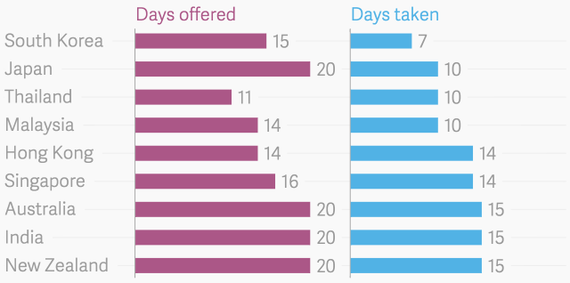One of the first countries to buy rights to Rest: How Working Less Gets More Done was Japan, and with good reason: Japan is notorious for a workforce that overworks, takes few vacation days, and suffers as a result. Half of vacations days in Japan are unused each year, making the country one of the worst consumers of vacation time, as this chart illustrates:

Only South Korea, continuing its long tradition of having to beat the Japanese in everything, is worse: not only are fewer vacation days offered by Korean companies than Japanese, the percentage of people who aren’t taking their meagre allotment is higher than in Japan.
While this sounds good for companies, it leads in the longer run to higher rates of stress and suicide, discourages women from entering the workforce, and doesn’t have as big a positive effect on productivity rates as you might expect. And it’s not like they don’t understand that there’s a problem: as the Japan Times said, “The culture of long working hours and unpaid overtime is regularly criticized as a leading cause of mental and physical illness among employees.” (The situation is Korea is as bad: it’s the hardest-working country in show business, but doesn’t have higher productivity rates.)
Now the Japanese government is considering requiring people to take more time off, and penalizing companies that do not mandate vacation day use. Additionally, “In recent years there has been a move to shift the days so that they fall adjacent to the weekend, making domestic holidays more of a possibility,” which also seems like a no-brainer.